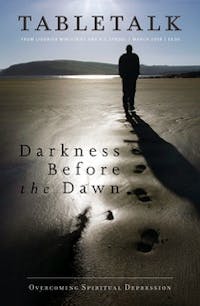
Request your free, three-month trial to Tabletalk magazine. You’ll receive the print issue monthly and gain immediate digital access to decades of archives. This trial is risk-free. No credit card required.
Try Tabletalk NowAlready receive Tabletalk magazine every month?
Verify your email address to gain unlimited access.
I have a high regard for the depravity of man. Without contest, the supreme sinfulness of sinners is the most disregarded reality — the world over. The fall of man is quite possibly the most forgotten, under appreciated, and misunderstood event in history. For this reason, many in our day preach “salvation” but neglect to preach sin; many talk about Christ but fail to talk about conviction; many offer testimonies about renewal but forget to mention repentance.
In our post postmodern society, you might get away with talking about Jesus with a Muslim; you might be able to have a great conversation with a Jewish friend about Christmas; you might be at liberty to say “God bless you” to an atheist; you may still even be able to pledge your allegiance to a nation “under God,” but don’t you dare mention a word about that awful, three-letter word sin-. It is certainly true that sin, Satan, and spiritual death are among society’s dirty words, and you dare not speak them in polite company lest you incur the wrath of the most outspoken, self-appointed, religiously correct person present. To the Gospel’s great misfortune, if it could know such misfortune, many in our churches have fallen prey to this sort of religiously correct philosophy of life. As a result, many have struggled to understand the good news without first knowing the bad news — and in the context of spiritual life and death, no news is most certainly bad news. Without the bad news about sin, Satan, and spiritual death, the good news is superfluous at best.
In my estimation, it is for this seemingly contradictory reason that so many Christians are spiritually depressed. In fact, such a designation is in itself a contradiction in terms — a “spiritually depressed Christian.” We get depressed on account of the fact that we have underestimated the power and reality of sin, and we have thus underestimated the power and reality of the Gospel. The darkness of spiritual depression will not lift until we have sought forgiveness before the very face of God, coram Deo. For it is only when we rightly regard our sin that we will be able rightly to cling to the forgiveness, liberty, joy, and abundant life from the Light of the World.
